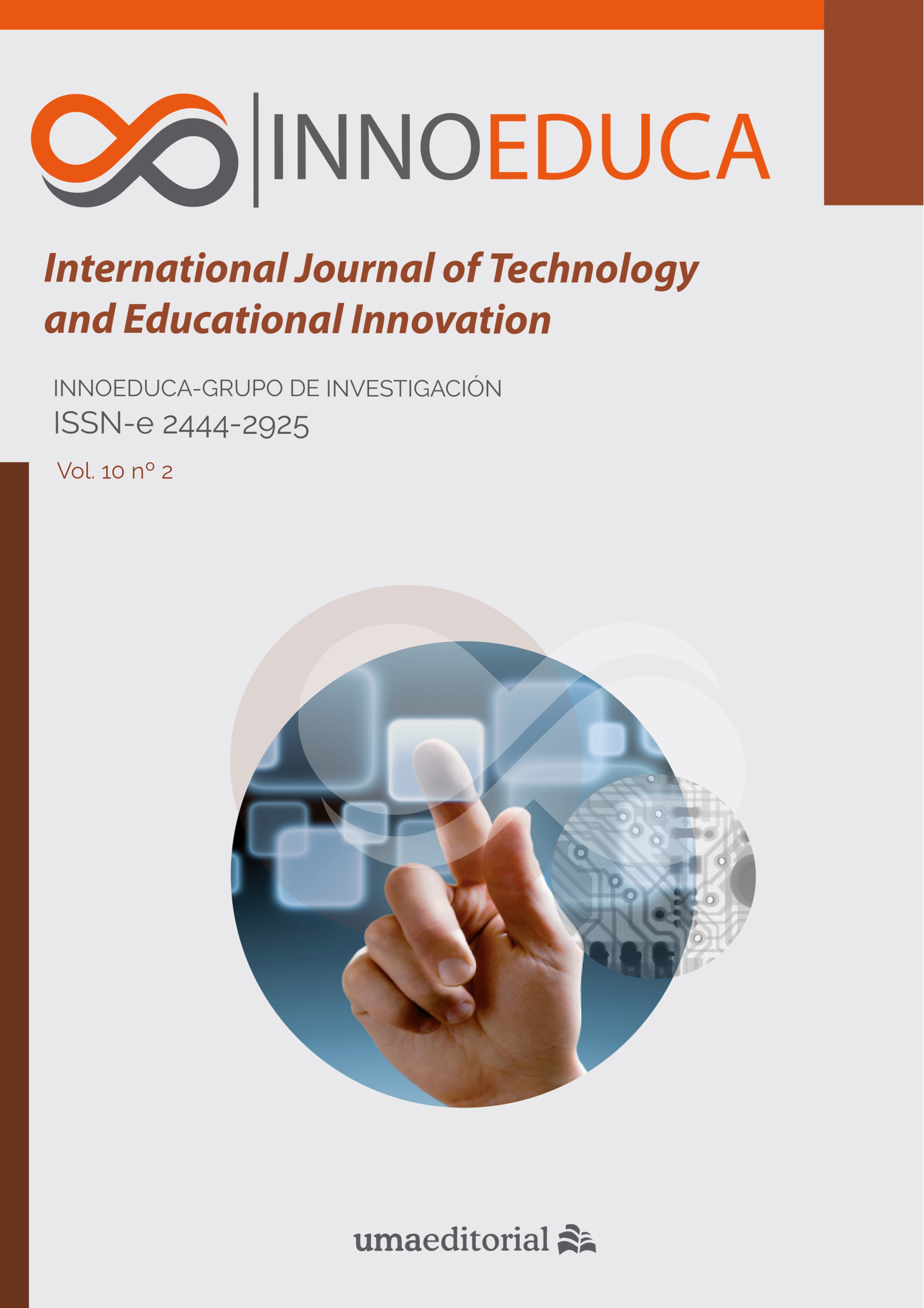Evaluación de una escala sobre conocimiento de las TIC aplicadas a la inclusión educativa: Un enfoque desde el Modelo de Respuesta Graduada
DOI:
https://doi.org/10.24310/ijtei.102.2024.20202Palabras clave:
MRG, escala de medición, TIC, inclusión, formación inicial docenteResumen
El rápido avance de las Tecnologías de la Información y la Comunicación (TIC) representa un desafío y una oportunidad crucial para la sociedad contemporánea. Estas herramientas no solo han transformado la manera en que las personas se comunican y trabajan, sino que también han redefinido los paradigmas pedagógicos, planteando nuevas exigencias y posibilidades para los sistemas de enseñanza. La incorporación de estos recursos en las aulas promueve la equidad y calidad educativa, preparando a los estudiantes con diversidad funcional para un mundo cada vez más digitalizado y favoreciendo procesos de enseñanza-aprendizaje accesibles, innovadores e inclusivos. El objetivo de este estudio es evaluar una escala para medir el conocimiento de los futuros docentes sobre las TIC aplicadas a la inclusión educativa mediante el Modelo de Respuesta Graduada (MRG). Se ha llevado a cabo un estudio psicométrico sobre una muestra no probabilística de 684 estudiantes universitarios del Grado en Educación Primaria de diferentes universidades públicas andaluzas, utilizando una versión reducida de la Escala de Conocimiento de las TIC aplicadas a las personas con diversidad funcional de Cabero-Almenara et al. (2016). Los datos reflejan una diversidad significativa en el conocimiento de los participantes sobre las TIC aplicadas a personas con diversidad funcional. Además, la precisión en la estimación de las puntuaciones latentes respalda la validez del instrumento de medición. Los resultados indican que la escala empleada no solo es efectiva para medir el conocimiento promedio de los participantes, sino que también es capaz de detectar variaciones significativas entre individuos. Por tanto, se concluye que esta escala es una herramienta predictiva útil para identificar deficiencias formativas y diseñar planes de estudios que respondan a estas necesidades.
Descargas
Métricas
Citas
Almerich, G., Suárez-Rodríguez, J., Díaz-García, I., & Orellana, N. (2020). Structure of 21st century competencies in students in the educational field. Influential personal factors. Educación XX1, 23(1), 45-74. https://doi.org/10.5944/educXX1.23853
Ari, R., Altinay, Z., Altinay, F., Dagli, G., & Ari, E. (2022). Sustainable management and policies: the roles of stakeholders in the practice of inclusive education in digital transformation. Electronics, 11(4), 1-16. https://doi.org/10.3390/electronics11040585
Baker, F., & Kim, S.H. (2004). Item Response Theory. Marcel Dekker.
Bentler, P. M. (1990). Comparative fit indexes in structural models. Psychological Bulletin, 107(2), 238-246. https://doi.org/10.1037/0033-2909.107.2.238
Blasco-Serrano, A. C., Bitrián-González, I., & Coma-Roselló, T. (2022). Incorporation of ICT in initial teacher training through Flipped Classroom to promote inclusive education. EDUTEC, (79), 9-29. https://doi.org/10.21556/edutec.2022.79.2393
Browne, M. W., & Cudeck, R. (1993). Alternative ways of assessing model fit. In K. A. Bollen & J. S. Long (Eds.), Testing structural equation models (pp. 136-162). Sage.
Cabero-Almenara, J., Fernández-Batanero, J. M., & Córdoba-Pérez, M. (2016). Knowledge of ICT applied to people with disabilities. Construction of a diagnostic instrument. Magis, International Journal of Research in Education, 8(17), 157-176. https://doi.org/10.11144/Javeriana.m8-17.ctap
Cabero-Almenara, J., Guillén-Gámez, F. D., Ruiz-Palmero, J., & Palacios-Rodríguez, A. (2022). Teachers' digital competence to assist students with functional diversity: Identification of factors through logistic regression methods. British Journal of Educational Technology, 53(1), 41-57. https://doi.org/10.1111/bjet.13151
Cabero-Almenara, J., & Martínez, A. (2019). Information and communication technologies and initial teacher education: digital models and competences. Profesorado, Revista de Currículum y Formación de Profesorado, 23(3), 247-268. https://doi.org/10.30827/profesorado.v23i3.9421
Chou, Y.T., & Wang, W.C. (2010). Checking Dimensionality in Item Response Models With Principal Component Analysis on Standardized Residuals. Educational and Psychological Measurement, 70(5), 717-731. https://doi.org/10.1177/0013164410379322
Colás-Bravo, M. P., & Buendía-Eisman, L. (1998). Educational research (3rd ed.). Alfar.
Díaz-García, I., Almerich-Cerveró, G., Suárez-Rodríguez, J., & Orellana-Alonso, N. (2020). The relationship between ICT competences, ICT use and learning approaches in university education students. Journal of Educational Research, 38(2), 549-566. https://doi.org/10.6018/rie.409371
Ferrando, P.J., Lorenzo-Seva, U., Hernández-Dorado, A., & Muñiz, J. (2022). Decalogue for the Factorial Analysis of Test Items. Picothema, 34(1), 7-17. https://doi.org/10.7334/psicothema2021.456
Gallardo-Montes C. P., Caurcel-Cara, M. J., Crisol-Moya, E., & Peregrina-Nievas, P. (2023). ICT Training Perception of Professionals in Functional Diversity in Granada. International Journal of Environmental Research and Public Health, 20(3), 2064. https://doi.org/10.3390/ijerph20032064
Guillén-Gámez, F. D., Mayorga-Fernández, M. J., & Álvarez-García, F. J. (2020). A Study on the Actual Use of Digital Competence in the Practicum of Education Degree. Tech Know Learn, 25, 667-684. https://doi.org/10.1007/s10758-018-9390-z
Harman, H. H. (1976). Modern factor analysis (3rd ed.). University of Chicago Press.
Hooper, S., & Rieber, L. P. (1995). Teaching with technology. In A. C. Ornstein (Ed.), Teaching: Theory into practice (154-170). Allyn and Bacon.
Instituto Nacional de Tecnologías del Aprendizaje y de Formación del Profesorado [INTEF] (2022). Marco de Referencia de la Competencia Digital Docente. INTEF. http://aprende.intef . en/mccdd
Kerexeta-Brazal, I., Darretxe-Urrutxi, L., & Martínez-Monje, P. M. (2022). Digital competence in teaching and educational inclusion at school. A systematic review. Campus Virtuales, 11(2), 63-73. https://doi.org/10.54988/cv.2022.2.885
Krumsvik, R. J. (2014). Teacher educators' digital competence. Scandinavian Journal of Educational Research, 58(3), 269-280. https://doi.org/10.1080/00313831.2012.726273
Lai, K., & Green, S. B. (2016). The Problem with Having Two Watches: Assessment of Fit When RMSEA and CFI Disagree. Multivariate Behavioral Research, 51(2-3), 220-239. https://doi.org/10.1080/00273171.2015.1134306
Laitón, E.V., Gómez, S.E., Sarmiento, R.E., & Mejía, C. (2017). Inclusive practice competence: ICT and inclusive education in teacher professional development. Sophia 13(2), 82-95. https://doi.org/10.18634/sophiaj.13v.2i.502
López-Falcón, A. (2021). The types of research results in educational sciences. Revista Conrado, 17(S3), 53-61.
Lorenzo-Seva, U., Timmerman, M. E., & Kiers, H. A. L. (2011). The Hull method for selecting the number of common factors. Multivariate Behavioral Research, 46(2), 340-364. https://doi.org/10.1080/00273171.2011.564527
Masoumi, D. (2021). Situating ICT in early childhood teacher education. Education and Information Technologies, 26, 3009-3026. https://doi.org/10.1007/s10639-020-10399-7
Mishra, P., & Koehler, M.J. (2006). Technological pedagogical content knowledge: A framework for teacher knowledge. The Teachers College Record, 108(6), 1017-1054. https://doi.org/10.1111/j.1467-9620.2006.00684.x
Moriña, A. (2020). Faculty members who engage in inclusive pedagogy: Methodological and effective strategies for teaching. Teaching and Higher Education, 27(3), 1-16. https://doi.org/10.1080/13562517.2020.1724938
Nieto-Isidro, S., Martínez-Abad, F., & Rodríguez-Conde, M. J. (2022). Observed and Self-perceived Informational Competence in teachers and future teachers and its relationship with socio-demographic variables. Revista de Educación, (396), 35-64. https://doi.org/10.4438/1988-592X-RE-2022-396-529
Panayides, P. (2013). Coefficient Alpha: Interpret With Caution. Europe's Journal of Psychology, 9(4), 687-696. https://doi.org/10.5964/ejop.v9i4.653
Parody-García, L. M. (in press). New trends in initial and in-service teacher training for the development of digital competences applied to inclusive education. Pedagogical realities and challenges. [Doctoral thesis]. University of Malaga.
Parody-García, L.M., Leiva-Olivencia, J.J., & Santos-Villalba, M.J. (2022). Universal Design for Learning in Digital Teacher Training from an Inclusive Pedagogical View. Revista Latinoamericana de Educación Inclusiva, 16(2), 109-123. https://dx.doi.org/10.4067/S0718-73782022000200109
Parra, L., & Agudelo, A. (2020). Innovation in ICT-mediated pedagogical practices. In R. Canales & C. Herrera (eds.). Access, democracy and virtual communities (pp. 51-64). CLACSO.
Pegalajar, M. C. (2017). Future teachers and the use of ICT for inclusive education. Digital Education Review, (31), 131-148.
Pinto-Santos, A. R., Pérez-Garcias, A., & Darder-Mesquida, A. (2023). Digital competence training for teachers: functional validation of the TEP model. Innoeduca. International Journal of Technology and Educational Innovation, 9(1), 39-52. https://doi.org/10.24310/innoeduca.2023.v9i1.15191
R Core Team (2022). R: A language and environment for statistical computing. R Foundation for Statistical Computing, Vienna, Austria. https://www.R-project.org/.
Recio-Muñoz, F., Silva-Quiroz, J., & Abricot-Marchant, N. (2020). Analysis of digital competence in the initial training of university students: A meta-analysis study in the Web of Science. Pixel-Bit. Journal of Media and Education, (59), 125-146. https://doi.org/10.12795/pixelbit.77759
Ripoll-Rivaldo, M. (2021). Pedagogical practices in teacher training: from the didactic axis. Telos: Revista de Estudios Interdisciplinarios en Ciencias Sociales, 23(2), 286-304. https://doi.org/10.36390/telos232.06
Rizopoulos, D. (2006). ltm: An R Package for Latent Variable Modeling and Item Response Analysis. Journal of Statistical Software, 17(5), 1-25. https://doi.org/10.18637/jss.v017.i05
Romero-Martínez, S. J., & Ordóñez-Camacho, X. G. (2015). Psychometrics. Centro de Estudios Financieros.
Samejima, F. (1969). Estimation of Latent Ability using a Response Pattern of Graded Scores. Psychometrika Monograph Supplement.
Silva, J., Lázaro, J. L., Miranda, P., & Canales, R. (2018). The development of teachers' digital competence during teacher training. Opción, 34(86), 423-449.
Tejedor, F. J., García-Valcárel, A., & Prada, S. (2009). Measuring university teaching staff attitudes towards ICT integration. Comunicar, 17(33), 115-124. https://doi.org/10.3916/c33-2009-03-002
United Nations Educational, Scientific and Cultural Organization [UNESCO] (2019). ICT Competency Framework for Teachers. UNESCO. https://unesdoc.unesco.org/ark:/48223/pf0000371024
Van der Linden, W.J., & Hambleton, R.K. (1997). Handbook of Modern Item Response Theory. Springer.
Vigo, M.B. (2021). Development of creative and inclusive teaching practices with digital media. In C. Latorre and A. Quintas (Coords.), Inclusión educativa y tecnologías para el aprendizaje (pp.129-144). Octaedro.
Widaman, K. F. (2007). Common factors versus components: Principals and principles, errors, and misconceptions. In R. Cudeck & R. C. MacCallum (Eds.), Factor analysis at 100: Historical developments and future directions (pp. 177-203). Lawrence Erlbaum Associates.
Wismeijer, A. A. A. J., Sijtsma, K., van Assen, M. A. L. M., & Vingerhoets, A. J. J. J. M. (2008). A Comparative Study of the Dimensionality of the Self-Concealment Scale Using Principal Components Analysis and Mokken Scale Analysis. Journal of Personality Assessment, 90(4), 323-334. https://doi.org/10.1080/00223890802107875
Descargas
Publicado
Cómo citar
Número
Sección
Licencia
Derechos de autor 2024 Innoeduca. International Journal of Technology and Educational Innovation

Esta obra está bajo una licencia internacional Creative Commons Atribución-NoComercial-SinDerivadas 4.0.
Todos los contenidos publicados por Innoeduca. International Journal of Technology and Educational Innovation están sujetos a la licencia de Creative Commons Reconocimiento-No comercial- SinObraDerivada 4.0 Internacional, cuyo texto completo se puede consultar en https://creativecommons.org/licenses/by-nc-nd/4.0/legalcode. Por lo tanto, la copia, distribución, comunicación pública, obras derivadas y el uso comercial de los contenidos están permitidas siempre que la fuente y el autor del texto se citen.
Es responsabilidad de los autores obtener los permisos necesarios de las imágenes que están sujetas a derechos de autor.

Este obra está bajo una licencia de Creative Commons Reconocimiento-NoComercial-SinObraDerivada 4.0 Internacional.









.jpg)


241.png)











